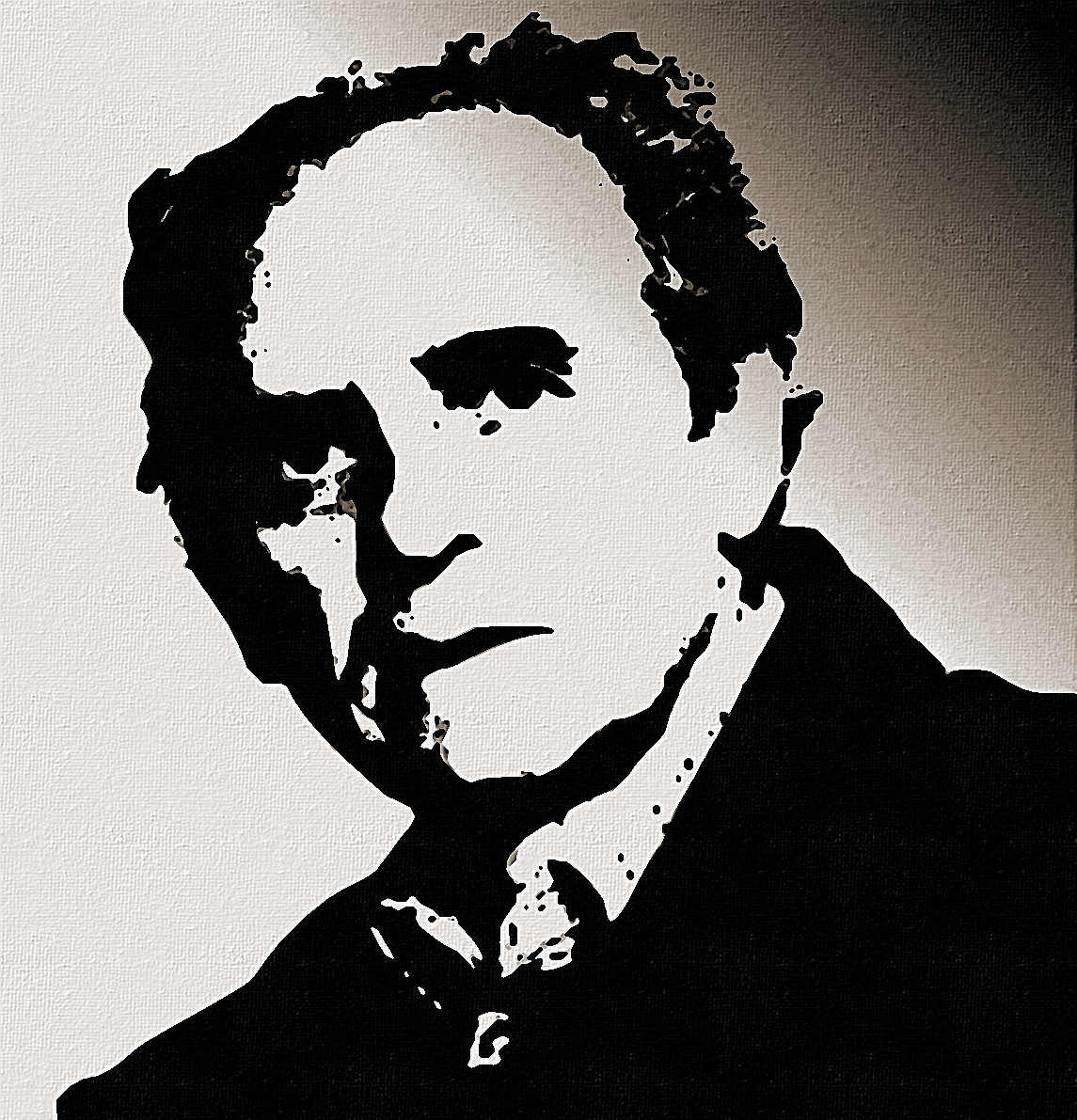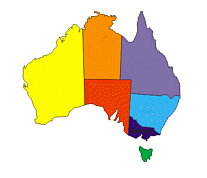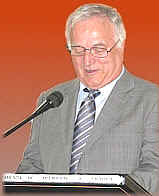 Dimitris
Tsaloumas was born in 1921 on the
island of Leros in the Dodecanese, then under Italian
occupation and completed his education in Greek and Italian
Schools. The persecution for his political views by the
Greek gendarmes after those islands were handed over to
Greece, compelled him to seek refuge in Australia in 1951.
In Australia he studied Arts at the University of Melbourne,
with English and French as his majors and subsequently he
taught English and French in Victorian schools till 1982. He
started writing poetry again in 1963. In 1973 he published
his first book in Australia and by 1983 he had published six
collections. In 1983 a selection of his poems were
translated into English by Philip Grundy and published under
the title The Observatory by the University of
Queensland Press. The Observatory was greeted with
enthusiasm by many Australian critics and in the same year
it received the Australian Book Council Award. A
translation of another poetic book The Book of Epigrams
was published in 1985, translated again by Philip Grundy and
which had also an enthusiastic reception.
Dimitris
Tsaloumas was born in 1921 on the
island of Leros in the Dodecanese, then under Italian
occupation and completed his education in Greek and Italian
Schools. The persecution for his political views by the
Greek gendarmes after those islands were handed over to
Greece, compelled him to seek refuge in Australia in 1951.
In Australia he studied Arts at the University of Melbourne,
with English and French as his majors and subsequently he
taught English and French in Victorian schools till 1982. He
started writing poetry again in 1963. In 1973 he published
his first book in Australia and by 1983 he had published six
collections. In 1983 a selection of his poems were
translated into English by Philip Grundy and published under
the title The Observatory by the University of
Queensland Press. The Observatory was greeted with
enthusiasm by many Australian critics and in the same year
it received the Australian Book Council Award. A
translation of another poetic book The Book of Epigrams
was published in 1985, translated again by Philip Grundy and
which had also an enthusiastic reception.
In 1985 Tsaloumas published also a large bilingual
anthology of his translations into Greek of works of
Australian poets under the title
Contemporary Australian Poetry –
Σύγχρονη Αυστραλιανή Ποίηση,
a joint publication by the University of Queensland Press, Brisbane and the
Νέα Πορεία Εκδόσεις,
Thessaloniki. Since 1985 Tsaloumas started writing poetry in
English and up to now has published several collections in
English. It wasn’t until 2003 that he published another
Greek book of verse. This post-1985 work includes the
collections: Falcon Drinking, Brisbane: University of
Queensland Press (UQP), 1988, Portrait of a Dog: UQP,
1992, The Barge, UQP, 1993, Six Improvisations on
the River, U. K.: Shoestring Press, 1996, The Harbour,
QUP, 1998, The Storeland Harvest: new and selected poems,
U. K.: Shoestring Press, 1999, New and Selected Poems,
UQP, 2000, Δίφορος
Καρπός, a selection of his
English poems translated into Greek by the poet himself, Owl
Publishing – Melbourne, 2001 and
Παρατηρήσεις Υποχονδριακού Β΄,
Εκδόσεις Σοκόλη,
Αθήνα,
2003. His latest English collection is Helen of Troy,
University of Queensland Press, 2007. Tsaloumas’ Collected
Greek poems have been published under the title
Το Ταξίδι,
volumes A and B with the co-operation of the
Εκδόσεις Σοκόλη,
Athens and the Owl Publishing – Melbourne, in 1995.
Tsaloumas taught as writer –in-residence at the University
of Queensland, the University of Melbourne, twice at La
Trobe University (1987 and 1990) and at Oxford University.
Dimitris Tsaloumas also received the Westley M. Wright
Award (1994) and the Patrick White Literary Award
(1994), the John Bray Award of the International
Festival of Adelaide in 2000, the highest distinction Emeritus Award of the Australian Council in 2001 for
outstanding contribution to Australian literature, and the
Christopher Brennan Award of the National Association
of Australian Writers in 2003.
Dimitris Tsaloumas is a brilliant poet writing in both Greek
and English. Peter Levi commenting on his poetry remarked
that ‘happy is the language that possesses such a poet’.
Several articles, reviews and some books have been devoted
to Tsaloumas’ literary achievement. These include the book
by Con Castan Dimitris Tsaloumas; Poet, Melbourne,
Elikia Books, 1990 and the volume Dimitris Tsaloumas. A
Voluntary Exile, a book of articles, interviews and
other texts edited by Helen Nickas and published by Owl
Publications – Melbourne, 1999. The last book contains an
introduction and an extended bibliography.
Dimitris, nice to see you back from Greece for the
Antipodian summer. Which is the place you call home?
I’ ve
spent 58 years of my life in Australia, so it’s only to be
expected that I should call Australia my home. Still deep
down, in spite of my attachment to various places, I regard
as my true home the place of my birth – the small sea-bound
island of Leros.
You
came to Australia in 1951. How do you remember your
experiences in Leros? And why did you decide to migrate to
Australia?
Which
experience do you mean? Before or after the war? I remember
and often live again the ones before the war with a deep
sense of nostalgia. Indeed they are the deep source of my
inspiration. And so, it is with the period up to the time I
left, the difference being that from those post-war
experiences on the island during the reactionary, fascist
governments indirectly appointed by the British and later
the Americans, the element of nostalgia is missing. Besides,
this is why I am in Australia.
What
were your early impressions and experiences of life in
Australia?
I wasn’t
happy at all. Far from it! I was terribly homesick for a
couple of years, hoping that democracy would soon be
restored in Greece and that I could then return there
without the nightmare of political persecution.
Does
a poet, today, communicate effectively with his audience?
It depends
on what you call poetry. For instance, those who write the
lyrics for the popular music bands seem to be communicating
exceedingly well with vast audiences. As for us – well, yes,
we do get a small number of appreciative readers. There’s
always a small number of them. However, this doesn’t
preoccupy me in the least, as long as I am convinced that
the finished poem conforms with my idea of what a good poem
should be like. I don’t aim at popularity. I couldn’t care
less. Besides, this is unattainable these days.
At
about 1985 you decided to write poetry in English. Why ?
It was
curiosity at first but it became a felt need with time. I
discovered and understood the rhythms of a language I’ve
been speaking for so many years, I saw new possibilities and
I set out to realize them. It’s amazing how everything came
easily as if practised all my life; how easily I could
invest my English verse with my customary music, bestow on
this other language the inflections and cadences of my own.
I was amazed, tremendously excited about all this, and I
enjoyed the experience so much that it was after producing a
number of books in English that I published a Greek
collection – Observations of a Hypochondriac II in
2003.
Some
people think you had an easy entry into Australian poetry.
I don’t
know about that. It was obvious that my work had some merit,
and the fact was recognized at once. I’ m grateful for the
recognition: it was as unexpected as it was generous, and it
came from several parts of the world. The degree of easiness
or difficulty of entry into such fields is in great part, if
not always, determined by the quality of one’s work.
Some
others have criticized you for writing in English.
I pay no
attention to them. My main concern is the satisfaction of my
own creative needs.
How
much has your close knowledge and use of two languages and
cultures influenced your poetic craft?
It’s
inevitable that the use of each language should influence
one’s way of thinking and feeling, sometimes consciously,
but mostly in secret, subterraneous ways. It’s very hard to
say. I suppose it would be hard for a poet who writes in an
acquired language to say whether what he writes reads and
sounds as true as if it would if written in his own. I’ve
been successful in this; in my work, I move with assurance
between the two languages.
Do you
consider yourself to be a pre-eminently lyrical poet?
Well, I
don’t decide the nature and the form of the poem beforehand.
Never. These things are determined by the theme
when it emerges with some clarity from the jumble of images
and the confusion of thoughts, the veritable chaos of the
beginning. It all develops as the poem begins to fall into
shape. There is no preconceived idea to my writing. My main
concern is that the poem should be true, vivid, a mixture of
drama and lyricism. Besides, the purely lyrical poem longer
than 10 – 15 lines bores me to death. Unless of course it’s
the work of some of the truly great poets. I like speech,
gesture, conflict, crisp, clear imagery above all.
You
have talked in the past with admiration for Elytis. You
haven’t said much about Seferis. However, your ‘Observatory’
seems to me closer to the dramatic ‘Logbooks’ of Seferis
rather than the lyrical outbursts of Elytis. Yet this is
also misleading. How do you see your work in relation to
other poets you like?
In the
years before the war, confined on a small island under
foreign occupation, cut off from mainland Greece and its
cultural life, my only experience of Greek poetry and
literature in general was almost non-existent. In fact, it
was limited to some popular short stories and half a dozen
poems from the standard Elementary School readers of my
early and only Greek schooling. Whatever I learned of the
language and its creative life, I taught myself, after the
schools were closed down by the occupying Fascist
Administration. I am a complete autodidact in this as in
some other areas vital to a sensitive person’s intellectual
and imaginative development.
So,
given the island’s isolation and complete lack of
communication with the mother country, my knowledge of Greek
literature did not extent beyond some very well known names,
writers such as Palamas, Solomos, Sikelianos and a few
others. It wasn’t until after the war, in 1947 I think, that
I came across the names of Seferis and Elytis with samples
of their work in some magazines, and one in particular whose
name I forget, published under the auspices of the British
Council, in Athens. It was late in 1948 that I met both men
in person and read their poetry published up to that time.
It made a tremendous impression on me, especially the work
of Seferis. It was to me a new, fascinating kind of poetic
speech, a new sense of rhythm, a deeper sense of music. I
had began to write (seriously I thought!) at about that time
and I obviously did so under the influence of that
experience. And it wasn’t until much later, until I came to
Australia, that I realized this and was appalled. I laughed
at my efforts and tore to small bits the two slender volumes
brought out before leaving Greece. Actually, I thought I
didn’t have any talent at all, and stopped writing for many
years, until I found my own voice and felt sure of myself.
As for
Elytis, no, he didn’t have any influence on me. I enjoyed
his poetry up and including Axion Esti but didn’t
care much for much that followed. I still love his earlier
work, I even translated his ‘Seven short Nocturnal Pieces’
into Italian.
I don’t
think you’ll find anything in my work published since 1974
that has anything to do with these two poets.
How
do you move in your poetry from the private to the public
domain.
It’s part
of the same process as far as I am concerned. As I have
already pointed out, there’s no programme to my writing. And
I am not interested in the promulgation of ideas; I embrace
ideas only if I can transform them into poetry. In my
opinion, the artist should aim at that and that alone. Prose
can do much better in the domain of ideas, propaganda and
politics.
You
move regularly between Greece and Australia. Does this
contribute to your poetry?
I am not
conscious of that. But it might have something to do with
it. Besides, all my Greek books were written in Australia
and a great deal of my English poetry was written on Leros.
This could well be related to your question.
Do
you see a mixture of Greek and Australian cultural
characteristics in the writing of your poetry?
I am not
fully aware of this or how it happens. I suppose you are
referring mainly to my books written in English. It is
inevitable that this should be so, especially in my
satirical work. Satire can only thrive within the satirist’s
own social context; it doesn’t function convincingly in any
other way. “Portrait of a Dog”, one of my books I
particularly cherish, is a good illustration of what I’m
saying. But there are instances of this in “The Book of
Epigrams” even – several poems in fact and some of my
strongest in that book.
“…And I turned within/ to seek the comfort of those island
treasures/ in your wilderness of foam and wind…” This
extract from your poem “Lines to A. D. Hope” is a reference
to the work of that poet. Do you feel some affinity with A.
D. Hope and his imagery of Australia?
I had been
asked to contribute to a volume of poems dedicated to A. D.
Hope and it occurred to me that sometime before this request
was made I had read a couple of poems of his which I had
enjoyed as strikingly new in the context of Australian
poetry in general and somewhat akin to some of my own ideas
and feelings regarding the very themes of these poems, as
well as the presence of a strong satirical disposition, the
lack of communication between people and the resulting sense
of alienation of which I had already spoken (passers-by
unbridged/ amid the hubbub…) in “The Book of Epigrams”
of 1982.
Would it be correct to refer to you and your work as the
poet of two languages and two cultures?
It’s not
for me to say. I let others be the judge of that. Not my
compatriots back home though, who, with a few exceptions,
pretend that I do not exist.
You
have translated some of your English poems into Greek and
published them in the volume “Diforos Karpos”. Do you find
equally satisfying re-creating your own work in the other
language?
Those are
not mere translation. The poems in “Diforos Karpos” have
been re-written in Greek. However, what impelled me to
translate those fifty poems in “D. K.” was my friends’
curiosity back home. They wished to know what I am writing
about in English and how.
Is
currently any book in the pipeline? Do you feel that still
there are things you want to say in your poetry?
At present
I am working at a small collection of poems which will be
published in May 2010. The working title of the collection
will be called Thirst. It will be published by the
Literary Review Planodion.
I write
poems when I feel the need to do so. I begin in a haphazard
way and things shape themselves in the process of sifting
through what comes up. Normally, I happen to write a poem
that acts as a magnet to other poems which expand and enrich
in many ways, directly or indirectly, the theme of that
magnet poem. Take Helen of Troy, for instance, the
title poem of my latest collection, a poem about beauty, a
celebration of it, which embraces even death and much that’s
appalling in the human condition. Generally this is the way
my collections are formed. I say the things I must say
within the framework and the demands of what I am working
on, which normally springs from some image, a fragment of
music, a memory or some vivid image that visits me
unexpectedly.
April
2010
(The
interview is an up-dated version of an earlier text
published in ‘Neos Kosmos English Supplement’ on 30 April
2007, under the title “A poet in motion”).
Christos Nicholas Fifis
Honorary Research Associate
School
of Historical and European Studies
La
Trobe University




